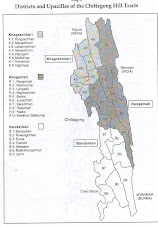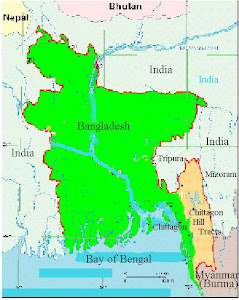Source from-http://www.thedailystar.net/story.php?nid=30223
The present caretaker government will soon reconstitute the Chittagong Hill Tracts (CHT) Land Commission to settle the longstanding land disputes between indigenous communities and settlers in the region.
Food and Disaster Management Adviser AMM Shawkat Ali yesterday said at a roundtable titled "Land Disputes in Chittagong Hill Tracts: Ways to settling the issue".
The government will appoint a new chairman to the Land Commission and is also planning to appoint two fulltime members to facilitate the works of the commission, he said.
"The present government will finish reorganising the Land Commission so that the next government can take it forward," the adviser said during the roundtable organised by eminent citizens at the city's WVA Auditorium.
Educationist Prof Zillur Rahman Siddiqui chaired the event and Prof Ajoy Roy presented the keynote paper.
Asked how the government will reorganise the commission, he said they will start reorganising the commission and the land ministry would finally work on the matter.
If the commission is reconstituted in the true sense, the longstanding problem would be settled, he said.
Shawkat said that they are yet to decide whether there would be one commission for the community of indigenous people in CHT region and indigenous people on plain lands or two commissions, one for each community.
He said the government would investigate why lands in the CHT area have been handed over to settlers despite the ban on reallocation of all lands there.
Special guest of the roundtable Chakma Raja Debashis Roy, also a special assistant to the chief adviser, said no governments, including the present one, has any cohesive policy regarding CHT affairs. Neither the government nor its ministries have any policy to reorganise settlements in CHT areas, he said.
He, however, said the present government is trying to focus on CHT development issues as much as it can.
Terming the "supreme power" of the chairman of the CHT Land Commission unconstitutional, he said the chairman is the main obstacle to settling the land disputes in CHT areas. He said there could be consensus between the commission and the regional parishad in settling the disputes and work on drafting laws to this end could be started by the present government.
He said after CHT Land Commission decides on the matter, it is the duty of the government to implement the decisions. He said the issue of CHT people's rehabilitation would certainly come to fore if the commission is reconstituted.
Prof Zillur Rahman Siddiqui said settling the longstanding land dispute in CHT areas is must. "As a nation, we will be blamed if we do not ensure indigenous communities' birth rights and if we failed to force the government to implement it," he said calling on the government to sit with major political parties and have their pledges in this regard.
Former adviser to a caretaker government advocate Sultana Kamal said the government must look into the problems of CHT areas with a humanitarian perspective. She said strong political will and pledges coupled with united effort are required to settle the land and other disputes in the CHT areas.
Gono Forum leader Pankaj Bhattacharya suggested holding broader dialogues between the government and the civil society in this regard.
Economist Prof Abul Barakat held previous governments responsible for patronising land grabbers. He said no government took any initiative to recognise the indigenous communities. He said 30 years ago 75 percent of the people in CHT areas were indigenous people but currently the percentage stands at 47, complicating the issue.
He said political will is required to settle the land disputes. Prof Barakat urged the government not to include any people from the anti-liberation war force in the land commission. He suggested that the government rehabilitate the Bangla speaking settlers on government lands outside CHT areas.
Writer and journalist Syed Abul Maksud demanded forming a high-powered commission to settle the land disputes in CHT areas.
Barrister Sara Hossain, Rabindranath Saren, and Shamsul Huda also spoke at the roundtable among others.
skip to main |
skip to sidebar


Map of Bangladesh

CHTs is number one Milliary zone in the world


Ministry of Chittagong Hill Tracts Affairs
The United Nation
The IJPMNA
This page provides information of the minority Indigenous Jumma Peoples in Chittagong Hill Tracts (CHTs) Bangladesh.
Contact with this please write:-ijpnusa@yahoo.com
Contact with this please write:-ijpnusa@yahoo.com
About Us
Location of Jummaland

Jumma Videos
- The BANDARBAN SADAR
- The Rowangchari
- The Ruma
- The Lama
- The Thanchi
- The Alikadom
- The Naikhkhongchari
- The RANGAMATI SADAR
- The Baghaichari
- The Langudu
- The Nanyachar
- The Barkal
- The Jurachari
- The Bilaichari
- The Kaptai
- The Rajsthali
- The Kawkhali
- The KHAGRACHARI SADAR
- The Manikchari
- The Laksmichari
- The Mahalchari
- The Matiranga
- The Ramgarh
- The Dighinala
- The Panchari
Audio & Video
Jumma Natok (Drama)
International Support
Educational Institution
Religious Organization
Buddhist Studies

Map of Bangladesh
Mission of Bangladesh
About Bangladesh
Bangali Audio Songs
Bengali News

CHTs is number one Milliary zone in the world
Online Audios
Refugee in Homeland

Jumma Picture

Blog Archive
About Me
- The Indigenous Jumma Peoples Movement in North America
- The Chittagong Hill Tracts (CHT) region comprises three districts: Banderban , Khagrachari and Rangamati. The districts comprise seven main valleys formed by the Feni, Karnafuli, Chengi, Myani, Kassalong, Sangu and Matamuhuri rivers aid their tributaries and numerous hills, ravines and cliffs covered with dense vegetation, which are in complete contrast to most other districts of Bangladesh, which consist mainly of alluvial lands. Geographically the CHT can be divided into two broad ecological zones: (a) hill valley, (b) agricultural plains. It is surrounded by the Indian states of Tripura on the north and Mizoram on the east, Myanmar on the south and east and Chittagong district on the west.
